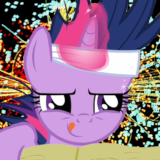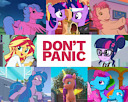Teaching science through fiction · 10:49pm Sep 13th, 2014
The idea that a story can teach the reader something is as old as storytelling itself. All genres of literature—poetry, plays, novels, fan fiction—have all set out to teach us something. But it is nearly always something of human interest (such as the magic of friendship).
More abstract stuff—mathematics, science, political philosophy—is rather more efficiency conveyed directly, without trying to spin it into a tale. But this makes it an arcane branch of knowledge, accessible only to an educated elite, who have taken the time to read all those dry books.
Can we use the power of storytelling to make at least the essence of this knowledge accessible to all? Explaining the basic principles, the excitement, some sense of it's awesomeness? And can we use it to teach schoolchildren—especially those reluctant students who think they're no good at science?
The idea has ancient roots. Socrates (470BC) and Plato wrote treatises in the Socratic dialogue—in which philosophy is explained through a conversation between two characters, a teacher and a student. Galileo used this idea for his Dialogue Concerning the Two Chief World Systems (1632), in which three characters discuss the models to describe the movement of the sun, moon and planets. This was maybe to escape the attention of censors: any heretical opinions are not expressed by the author, but by fictional characters. But this strategy was only partly successful—the book was approved for publication, but Galileo was in due course convicted of heresy and ended his life under house arrest.
But the best works are not just telling a story about characters discussing science, but actually weaving the science into the plot in a way that the reader wants to learn about it in order to find out what's going to happen.
One children's author I admire is Russell Stannard. His novel The Time and Space of Uncle Albert (1989) explains Einstein's theory of special relativity to school children, through an ingenious plot in which Uncle Albert and his niece investigate the nature of space and time in a series of thought experiments with a space ship and talking computer.
Professor Stannard wrote two sequels to Uncle Albert. Less well known is his novel Dr Dyers Academy (2002) which illustrates some of the pitfalls of this game. It's an ambitious innovative idea: Dr Dyer is a rogue headmaster with a malicious plan to spread chaos and confusion in the world by teaching misleading and incorrect science in his school. But his pupils figure out what he is up to and thwart his evil plans. It's a very clever idea: instead of just treating science as a list of facts to be learnt, get children to actually think about what they are being taught and question it. Unfortunately the book has a fatal flaw: it's boring. Read a page next to page of Harry Potter and you'll understand. We can only speculate what might have happened if Stannard had teamed up with JK Rowling.
Also worthy of mention is Jostein Gaarder's novel Sophie's World. The scale of this is impressive. It's a 400 page textbook on the history of philosophy (on the reading list for some university courses), but written entirely as a novel.
There's a lot more I could mention. I was going to finish with a discussion of the pony fan fiction which takes on this challenge. But I think I've written enough for this post, so I'll leave that for another day (it really deserves a full post). But I'll just highlight two writers worth watching: mylittleeconomy (ponies and economics), Lopsy (ponies and calculus). And there's plenty of interesting stuff in the Science! in Equestria group.




Try A Robust Solution. Game Theory Lite, mostly because I wanted to focus on Fluttershy and her emotional problem, but it's definitely game theory. I also like the way I characterized Rarity as highly-intelligent -- some writers miss that in all her cute femininity.
2452980
Oh Pineta and Jordan, ¡Thanks for the Channel User/Stor/Group-Recommendations!
Alice in Wonderland might deserve a mention, and perhaps Harry Potter and the Methods of Rationality for its modern day counterpart. Probably this is a wider field than we might initially expect. The Magic School Bus. And so on.
Brad DeLong does Socratic (or non-Socratic) dialogues sometimes.
There is a series of crime fiction novels where the detective uses economics to solve crimes.
Russ Roberts wrote three fiction books teaching various essentials in economics.
Of course, the classic, I, Pencil. (video)
Economics models in general are often referred to as storytelling. Robinson Crusoe is the modal choice for illustrations of some basic economic forces.
Thank you for the mention. I look forward to your thoughts on teaching science through ponies.
2454105
Alice in Wonderland? Am I missing something? Lewis Carroll said, I can guarantee that the books have no religious teaching whatever in them - in fact they do not teach anything at all. Great book though.
HPMOR certainly fits this category. I'm not familiar with the others - thanks for the list. I did read Robinson Crusoe years ago, but I don't remember the economics, but that makes sense, given all the non-fiction Defoe wrote. I was just skimming through some of his stuff on Anglo-Scottish Union, being rather topical this week.
Flatland, which is fairly well known, might count (decent introduction to dimensions, especially the idea of higher dimensions). But I've read a few unofficial sequels and they went farther. Sphereland introduces the idea of curved space, and expanding space. Flatterland ("like flatland, only more so") takes the cake, though. Starts off by showing a character from Flatland higher dimensions, but then it goes on to concepts like fractal dimension (and fractals, for that matter), the projective plane, group theory, hyperbolic geometry, quantum physics, relativity, black holes, wormholes, various flavors of spaces, topological defects (like cosmic strings), time travel, topology, and so on. It's pretty much a whirlwind tour of modern (well, up to the turn of the century) math and physics. It doesn't go into depth on anything, but it brings across the core concepts.
2454190
Carroll was a mathematician and a logician, and much of the crux of the story is arguments about logic. See here. But perhaps it is not such a good example. Of course, there is What the Tortoise Said to Achilles.
I have not actually read Robinson Crusoe; I suspect most economists haven't. However, when economists want to treat a very simple economy and work in complications in discrete, clear ways, building an economy from the ground up, they start with Robinson Crusoe on his island. Friday soon appears, they trade and so forth. A third person shows up and the barter economy becomes monetary, etc. It has become a bit of a cliché.
2454306
Oh sure, I get your point now. It's just when writing this post I was thinking of stories which set out to teach some sort of academic syllabus, and as Carroll was adamant that Alice was just to entertain (a radical idea at the time, when most children's stories were written to teach Christian morals) it didn't seem to fit. But even if it doesn't teach, we can still learn something by deconstructing his absurdist logic, spotting the signature of a mathematician, and explaining just why his nonsensical world is so entertaining.